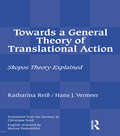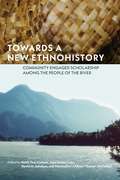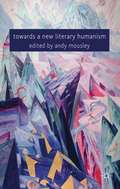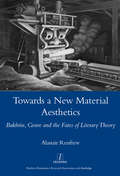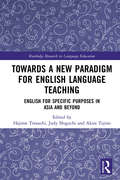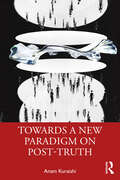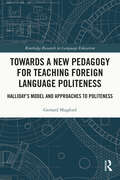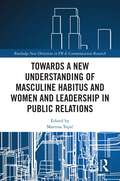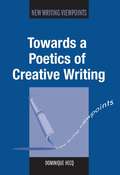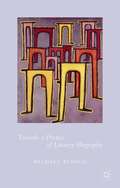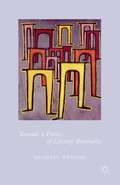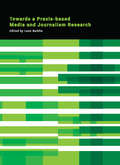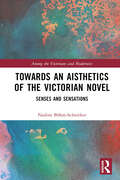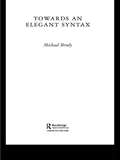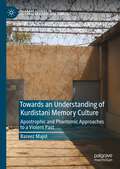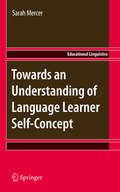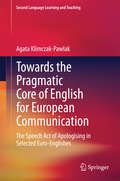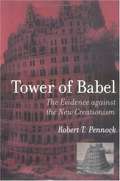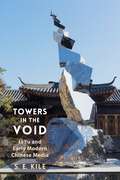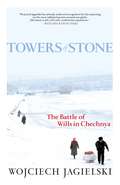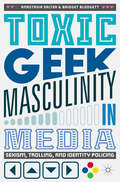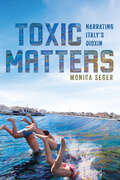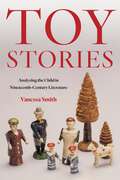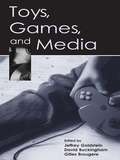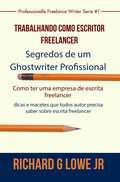- Table View
- List View
Towards a General Theory of Translational Action: Skopos Theory Explained
by Katharina Reiss Hans J VermeerThis is the first English translation of the seminal book by Katharina Reiß and Hans Vermeer, Grundlegung einer allgemeinen Translationstheorie, first published in 1984. The first part of the book was written by Vermeer and explains the theoretical foundations and basic principles of skopos theory as a general theory of translation and interpreting or ‘translational action’, whereas the second part, penned by Katharina Reiß, seeks to integrate her text-typological approach, first presented in 1971, as a ‘specific theory’ that focuses on those cases in which the skopos requires equivalence of functions between the source and target texts. Almost 30 years after it first appeared, this key publication is now finally accessible to the next generations of translation scholars. In her translation, Christiane Nord attempts to put skopos theory and her own concept of ‘function plus loyalty’ to the test, by producing a comprehensible, acceptable text for a rather heterogeneous audience of English-speaking students and scholars all over the world, at the same time as acting as a loyal intermediary for the authors, to whom she feels deeply indebted as a former student and colleague.
Towards a New Ethnohistory: Community-Engaged Scholarship among the People of the River
by John Sutton Lutz Keith Thor Carlson David M. Schaepe Naxaxalhts’i – McHalsie"Towards a New Ethnohistory" engages respectfully in cross-cultural dialogue and interdisciplinary methods to co-create with Indigenous people a new, decolonized ethnohistory. This new ethnohistory reflects Indigenous ways of knowing and is a direct response to critiques of scholars who have for too long foisted their own research agendas onto Indigenous communities. Community-engaged scholarship invites members of the Indigenous community themselves to identify the research questions, host the researchers while they conduct the research, and participate meaningfully in the analysis of the researchers’ findings. The historical research topics chosen by the Stó:lō community leaders and knowledge keepers for the contributors to this collection range from the intimate and personal, to the broad and collective. But what principally distinguishes the analyses is the way settler colonialism is positioned as something that unfolds in sometimes unexpected ways within Stó:lō history, as opposed to the other way around. This collection presents the best work to come out of the world’s only graduate-level humanities-based ethnohistory field school. The blending of methodologies and approaches from the humanities and social sciences is a model of twenty-first century interdisciplinarity.
Towards a New Literary Humanism
by Andy MousleyLiterature cultivates 'deep selves' for whom books matter because they take over from religion fundamental questions about the meaning of existence. This volume embraces and questions this perspective, whilst also developing a 'new humanist' critical vocabulary which specifies, and therefore opens to debate, the human significance of literature.
Towards a New Material Aesthetics: Bakhtin, Genre and the Fates of Literary Theory
by Alastair Renfrew"Set in the context of the various materialist approaches to literary aesthetics that emerged in the twentieth century, Renfrew's study presents a new synthesis of the work of Mikhail Bakhtin (1895-1975) and his circle, Russian Formalism, and elements of the 'official' ideology of the early Soviet period. The book's central aim in offering such a synthesis is to negotiate the poles of postmodernist subjectivism and 'traditional' materialism around which much current literary and critical theory has stagnated, and, as the title suggests, to point the way towards a newly conceived material basis for textual and literary analysis."
Towards a New Paradigm for English Language Teaching: English for Specific Purposes in Asia and Beyond (Routledge Research in Language Education)
by Akira Tajino Hajime Terauchi Judy NoguchiThis book proposes a new paradigm for English language teaching based on concepts from English for Specific Purposes (ESP) research and applications as well as from growing evidence relating pattern recognition to language learning ability. The contributors to the volume argue that learners should not try to become proficient all-around users of ‘idealistic native-like’ English, but instead should be realistic about what they need to acquire and how to go about achieving their specific goals. The book discusses the present situation by describing the status quo of English language education in Japan, taking into consideration recent trends of CLIL (content and language integrated learning), EMI (English medium instruction), and TBLT (task-based language teaching) as well as the work done on the Common European Framework of Reference for Languages (CEFR). It introduces new movements in ESP in Japan and in other Asian regions, covering topics ranging from genre analysis to corpus linguistics, and presents application examples of ESP practice in a range of educational situations in Japan from the graduate school level to elementary and middle school contexts. It also offers readers application examples of ESP practice in a range of business settings and expands the discussion to the global sphere where EAP and ESP are gaining importance as the number of ELF (English as a Lingua Franca) speakers continue to increase. The book will be of great interest to academics, researchers, and post-graduate students working in the fields of EFL and ESL.
Towards a New Paradigm on Post-truth
by Anam KuraishiThis book reconceptualises the idea of “post-truth”. It does not limit the domain of post-truth to the production factories of fake news. Drawing on examples such as Trump, War on Terror, anti-vaccination, climate change denial, denial of scientific facts about smoking, and so forth, it analyses the concept through a new theoretical lens which focuses on the specificity of post-truth discourses. Further, the volume develops a guide to operationalise post-truth discourse and makes use of Pakistan as a case study to illustrate post-truth discourses in Pakistani newspapers and implements an experiment to measure the effects of post-truth rhetoric on political attitudes.The volume will be essential reading for students, scholars, and researchers of media and communication studies, politics, and South Asian studies.
Towards a New Pedagogy for Teaching Foreign Language Politeness: Halliday’s Model and Approaches to Politeness (Routledge Research in Language Education)
by Gerrard MugfordThis book examines how foreign language speakers establish and maintain social and transactional relationships in their target language, and how pedagogic intervention can help learners implement practices that will allow them to participate and react in both socially acceptable and individualistically empowering ways. Arguing that ‘doing’ foreign-language politeness and culture does not simply involve the indiscriminate and uncritical adoption and implementation of target-language patterns and practices, the author advocates instead for active, judicious and even critical social action. As such, the book presents a dynamic and vibrant dimension to target language politeness and cultural practices, demonstrating that raising learners’ critical language awareness in identifying productive communicative resources and assets can lead to successful interpersonal and transactional communication. Building on this notion of a ‘positive’ pedagogy, Halliday’s model of ideational, interpersonal and textual is utilised as a framework for exploring how foreign language users can approach target language politeness in terms of prosocial, interpersonal and contested politeness, with reference to a study of Mexican speakers of English as a foreign language. Heightening awareness of foreign language politeness patterns and practices, as well as presenting knowledge and resources for overcoming challenges and accentuating benefits of a nuanced learning scheme for politeness in foreign language, this book will appeal to language educators, researchers and bilingual speakers. It will also benefit those working across pragmatics, sociolinguistics, TESOL, cultural studies.
Towards a New Understanding of Masculine Habitus and Women and Leadership in Public Relations (Routledge New Directions in PR & Communication Research)
by Martina TopićThis edited volume analyses leadership in the public relations (PR) industry with a specific focus on women and their leadership styles. It looks at how women lead, the inf luence of the socialisation process on leadership styles, the difference between feminine and masculine leadership styles, and the impact of leadership style on career opportunities for women. The book features case studies exploring leadership in PR around the world in an attempt to answer a central research question: is there a masculine habitus in the PR industry despite the rise of women in PR? The authors of each chapter conducted original research on women working in PR within their own country and provide original insights into the position of women in a feminised industry, as well as proposing new and original theoretical frameworks for future research. Written for scholars, researchers and students of PR and communication, this book will also be of interest to those studying gender studies, leadership and organisational analysis, and sociology.
Towards a Poetics of Creative Writing
by Dominique HecqThis book offers an in-depth study of the poetics of creative writing as a subject in the dramatically changing context of practice as research, taking into account the importance of the subjectivity of the writer as researcher. It explores creative writing and theory while offering critical antecedents, theoretical directions and creative interchanges. The book narrows the focus on psychoanalysis, particularly with regard to Lacan and creative practice, and demonstrates that creative writing is research in its own right. The poetics at stake neither denotes the study or the techniques of poetry, but rather the means by which writers formulate and discuss attitudes to their work.
Towards a Poetics of Literary Biography
by Michael BentonDrawing upon a wide range of biographies of literary subjects, from Shakespeare and Wordsworth to William Golding and V.S. Naipaul, this book develops a poetics of literary biography based on the triangular relationships of lives, works and times and how narrative operates in holding them together. Biography is seen as a hybrid genre in which historical and fictional elements are imaginatively combined. It considers the roles of story-telling, factual data in the art of life-writing, and the literariness of its language. It includes a case study of the biography of Ellen Terry, discussion of the controversial relationship between a subject's life and works, 'biographical criticism' and, through the issue of gender, the social and cultural changes biographies reflect. It frames a poetics on the basis of its strategy and tactics and demonstrates how the literal truth of verifiable data and the poetic truth of what is narrated are interdependent.
Towards a Poetics of Literary Biography
by Michael BentonDrawing upon a wide range of biographies of literary subjects, from Shakespeare and Wordsworth to William Golding and V.S. Naipaul, this book develops a poetics of literary biography based on the triangular relationships of lives, works and times and how narrative operates in holding them together. Biography is seen as a hybrid genre in which historical and fictional elements are imaginatively combined. It considers the roles of story-telling, factual data in the art of life-writing, and the literariness of its language. It includes a case study of the biography of Ellen Terry, discussion of the controversial relationship between a subject's life and works, 'biographical criticism' and, through the issue of gender, the social and cultural changes biographies reflect. It frames a poetics on the basis of its strategy and tactics and demonstrates how the literal truth of verifiable data and the poetic truth of what is narrated are interdependent.
Towards a Praxis-based Media and Journalism Research
by Leon BarkhoThis volume brings together current scholarly debates about how to bridge the gap between theory and practice in media and journalism research. Drawing on work from media scholars and media practitioners that focuses on how both sides can work together for the good of society, Towards a Praxis-based Media and Journalism Research is the first collection to examine how theory and practice can be combined for positive effect. The result will lay important groundwork for scholarship on this new and increasingly important idea in media and communication studies.
Towards an Aisthetics of the Victorian Novel: Senses and Sensations (Among the Victorians and Modernists)
by Nadine Böhm-SchnitkerTowards an Aisthetics of the Victorian Novel: Senses and Sensations establishes a new analytical method in the broader context of sensory studies in order to explain how the genre of the novel can impact on our perception of ourselves and our social contexts. Taking cultural literary studies ahead, the book re-integrates aesthetics – a much fraught concept in cultural studies that long favoured ‘popular’ over ‘high culture’ – into cultural studies as aisthetics in the word’s root sense of ‘perception’. Zooming in on period shifts and changes in taste spanning realism, sensation fiction and aestheticism, aisthetics reveals how these shifts also pertain to new ways of perceiving in selected novels by George Eliot, Wilkie Collins and Vernon Lee. Connecting Victorian and current literary theories, aisthetics helps explore the way in which the novel can shape the way we perceive the world, what remains excluded from the realm of the perceivable and how our conduct is consequently always also influenced by the dominant genres of our time.
Towards an Elegant Syntax (Routledge Leading Linguists)
by Michael BrodyThis collection of essays, written between 1980 and 2001, places the search for theoretical elegance at centre stage. The author shows that although the conceptual difference between 'elegance' and the minimalist search for 'perfection' may appear to be subtle, its consequences are in fact wide ranging and radical. These considerations lead to a markedly different and novel theory of syntax where most of the major features of minimalism, such as derivation, economy, merge, move, phrases and projection, are not just reanalysed or shifted to other components but in a majority of cases are dispensed with completely or reduced to much simpler notions.Towards an Elegant Syntax makes available important and some less easily accessible publications with new introductory material.
Towards an Understanding of Kurdistani Memory Culture: Apostrophic and Phantomic Approaches to a Violent Past (Palgrave Studies in Cultural Heritage and Conflict)
by Bareez MajidThis book presents a thorough analysis of the Kurdistan Region of Iraq’s memory culture, focusing particularly on commemorations and representations of the Anfal and Halabja atrocities. The author employs a transdisciplinary approach that draws on Memory Studies, Postcolonial Studies, Heritage Studies, Kurdish Studies, Literary Studies and Trauma Studies, to analyze cultural objects such as Kurdistani literary novels, museums, and school curricula. The book introduces two key concepts: the "phantomic museum" and the "apostrophic museum." The former explores the fragile and politicized nature of memories of missing individuals who disappeared during Saddam Hussein's genocidal campaigns and who have never been found, primarily as they return in the Halabja Monument and Peace Museum. The latter examines how the addressing – apostrophizing – of Kurdistan, in and by the Amna Suraka museum in the city of Sulaymaniyah, institutionalizes “official” and highly politicized versions of the past.
Towards an Understanding of Language Learner Self-Concept
by Sarah MercerThis book contributes to our growing understanding of the nature and development of language learner self-concept. It assesses the relevant literature in the disciplines of psychology and applied linguistics and describes in-depth, qualitative research examining the self-concepts of tertiary-level EFL learners. Although researchers in applied linguistics and SLA have recognized the importance of self-constructs, there remains little empirical work in the context of foreign language learning that focuses exclusively and at length on this central psychological construct. The content of this monograph draws on interdisciplinary sources, with input from psychology and applied linguistics. It will appeal to students and researchers interested in language-learner psychology as well as self-related constructs in general. The text provides insights into how learners view themselves, and how these self-beliefs can develop and affect the progress of an individual's language learning.
Towards the Pragmatic Core of English for European Communication
by Agata Klimczak-PawlakEnglish in Europe is not one but many, and substantial differences in the way people from different countries communicate using it may cause misunderstandings. This book shows that, through research into the pragmatic behaviour of non-native speakers of English from across Europe, it is possible to uncover the core-the shared strategies. This common pragmatic linguistic behaviour is proposed as the basis for a reference guide for those who wish to successfully communicate in English in Europe. The study reported on in this book is based on the analysis of the speech act of apologizing as realized by 466 respondents from 8 European countries, all proficient users of English involved in teacher-training programmes. The results Provide a basis for practical teaching and in-class research.
Tower of Babel: The Evidence Against the New Creationism
by Robert T. PennockFinalist in the ForeWord Magazine Book of the Year Awards. Creationism is no longer the simple notion it once was taken to be. Its new advocates have become more sophisticated in how they present their views, speaking of "intelligent design" rather than "creation science" and aiming their arguments against the naturalistic philosophical method that underlies science, proposing to replace it with a "theistic science." The creationism controversy is not just about the status of Darwinian evolution--it is a clash of religious and philosophical worldviews, for a common underlying fear among Creationists is that evolution undermines both the basis of morality as they understand it and the possibility of purpose in life. In Tower of Babel, philosopher Robert T. Pennock compares the views of the new creationists with those of the old and reveals the insubstantiality of their arguments. One of Pennock's major innovations is to turn from biological evolution to the less charged subject of linguistic evolution, which has strong theoretical parallels with biological evolution, both in content and in the sort of evidence scientists use to draw conclusions about origins. Of course, an evolutionary view of language does conflict with the Bible, which says that God created the variety of languages at one time as punishment for the Tower of Babel. Several chapters deal with the work of Phillip Johnson, a highly influential leader of the new Creationists. Against his and other views, Pennock explains how science uses naturalism and discusses the relationship between factual and moral issues in the creationism-evolution controversy. The book also includes a discussion of Darwin's own shift from creationist to evolutionist and an extended argument for keeping private religious beliefs separate from public scientific knowledge.
Towers in the Void: Li Yu and Early Modern Chinese Media
by S. E. KileThe maverick cultural entrepreneur Li Yu survived the tumultuous Ming-Qing dynastic transition of the mid-seventeenth century through a commercially successful practice founded on intermedial experimentation. He engaged an astonishingly broad variety of cultural forms: from theatrical performance and literary production to fashion and wellness; from garden and interior design to the composition of letters and administrative documents. Drawing on his nonliterary work to reshape his writing, he translated this wide-ranging expertise into easily transmittable woodblock-printed form. Towers in the Void is a groundbreaking analysis of Li Yu’s work across these varied fields. It uses the concept of media to traverse them, revealing Li Yu’s creative enterprise as a remaking of early modern media forms.S. E. Kile argues that Li Yu’s cultural experimentation exploits the seams between language and the tangible world. He draws attention to the materiality of particular media forms, expanding the scope of early modern media by interweaving books, buildings, and bodies. Within and across these media, Li Yu’s cultural entrepreneurship with the technology of the printed book embraced its reproducibility while retaining a personal touch. His literary practice informed his garden design and, conversely, he drew on garden design to transform the vernacular short story. Ideas for extreme body modification in Li Yu’s fiction remade the possibilities of real human bodies in his nonfiction writing. Towers in the Void calls for seeing books, bodies, and buildings as interlinked media forms, both in early modern China and in today’s media-saturated world, positioning the Ming and Qing as a crucial site of global early modern cultural change.
Towers of Stone: The Battle of Wills in Chechnya
by Wojciech Jagielski Soren A. GaugerIn Towers of Stone, award-winning Polish reporter Wojciech Jagielski brings into focus the tragedy of Chechnya, its inhabitants, and the war being waged there by a handful of desperate warriors against a powerful and much more numerous army. Jagielski's narrative is told through the lens of two men: Shamil Basaev, a hero to some, a dangerous warlord to others; and Aslan Maskhadov, a calculating and sober politician, who is viewed as a providential savior by some of his compatriots and a cowardly opportunist by the rest. Caught up in a war to which they owe everything and without which they could not live, the two fighters face enemy forces--and one another--in protean conflicts that prove hard to quell. Viewing the two men's personal story as a microcosm of the conflict threatening to devour a land and its peoples, Jagielski distills the bitter history of the region with forceful clarity.
Toxic Geek Masculinity in Media: Sexism, Trolling, and Identity Policing
by Anastasia Salter Bridget BlodgettThis book examines changing representations of masculinity in geek media, during a time of transition in which “geek” has not only gone mainstream but also become a more contested space than ever, with continual clashes such as Gamergate, the Rabid and Sad Puppies’ attacks on the Hugo Awards, and battles at conventions over “fake geek girls.” Anastasia Salter and Bridget Blodgett critique both gendered depictions of geeks, including shows like Chuck and The Big Bang Theory, and aspirational geek heroes, ranging from the Winchester brothers of Supernatural to BBC’s Sherlock and the varied superheroes of the Marvel Cinematic Universe. Through this analysis, the authors argue that toxic masculinity is deeply embedded in geek culture, and that the identity of geek as victimized other must be redefined before geek culture and media can ever become an inclusive space.
Toxic Matters: Narrating Italy’s Dioxin (Under the Sign of Nature)
by Monica SegerIn Toxic Matters, Monica Seger considers two Italian environmental disasters: an isolated factory explosion in Seveso, just north of Milan, in 1976 and the ongoing daily toxic emissions from the Ilva steelworks in the Apulian city of Taranto. Both have exposed residents to high concentrations of the persistent organic pollutant known as dioxin. Although different in terms of geography and temporality, Seveso and Taranto are deeply united by this nearly imperceptible substance, and by the representational complexities it poses. They are also united by creative narrative expressions, in literary, cinematic, and other forms, that push back against dominant contexts and representations perpetuated by state and industrial actors.Seger traces a dialogue between Seveso and Taranto, exploring an interplay between bodies, soil, industrial emissions, and the wealth of dynamic particulate matter that passes in between. At the same time, she emphasizes the crucial function of narrative expression for making sense of this modern-day reality and for shifting existing power dynamics as exposed communities exercise their voices. While Toxic Matters, is grounded in Italian cases and texts, it looks outward to the pressing questions of toxicity, embodiment, and storytelling faced by communities worldwide.
Toy Stories: Analyzing the Child in Nineteenth-Century Literature
by Vanessa SmithToy Stories: Analyzing the Child in Nineteenth-Century Literature explores the stakes of recurrent depictions of children’s violent, damaging, and tenuously restorative play with objects within a long nineteenth century of fictional and educational writing. As Vanessa Smith shows us, these scenes of aggression and anxiety cannot be squared with the standard picture of domestic childhood across that period. Instead, they seem to attest to the kinds of enactments of infant distress we would normally associate with post-psychoanalytic modernity, creating a ripple effect in the literary texts that nest them: regressing developmental narratives, giving new value to wooden characters, exposing Realism’s solid objects to odd fracture, and troubling distinctions between artificial and authentic interiority. Toy Stories is the first study to take these scenes of anger and overwhelm seriously, challenging received ideas about both the nineteenth century and its literary forms. Radically re-conceiving nineteenth-century childhood and its literary depiction as anticipating the scenes, theories, and methodologies of early child analysis, Toy Stories proposes a shared literary and psychoanalytic discernment about child’s play that in turn provides a deep context for understanding both the “development” of the novel and the keen British uptake of Melanie Klein’s and Anna Freud’s interventions in child therapy. In doing so, the book provides a necessary reframing of the work of Klein and Freud and their fractious disagreement about the interior life of the child and its object-mediated manifestations.
Toys, Games, and Media
by David Buckingham Jeffrey Goldstein Gilles BrougéreThis book is a state-of-the-art look at where toys have come from and where they are likely to go in the years ahead. The focus is on the interplay between traditional toys and play, and toys and play that are mediated by or combined with digital technology. As well as covering the technical aspects of computer mediated play activities, the authors consider how technologically enhanced toys are currently used in traditional play and how they are woven into childrens' lives. The authors contrast their findings about technologically enhanced toys with knowledge of traditional toys and play. They link their studies of toys to goals in education and to entertainment and information transfer.This book will appeal to students, researchers, teachers, child care workers and more broadly the entertainment industry. It is appropriate for courses that deal with the specialized subject of toys and games, media studies, education and teacher training, and child development.
Trabalhando como Escritor Freelancer – Segredos de um Ghostwriter Profissional
by Richard G Lowe JrEntão você acha que quer ser um ghostwriter freelancer? Talvez você tenha alguma experiência escrevendo ou queira ganhar um dinheiro extra. Talvez alguém pediu para você escrever um livro que queira publicar com seu próprio nome ou, possivelmente, você ouviu sobre essa coisa chamada ghostwriting e quis tentar. Ghostwriting é trabalho duro. É muito criativo e gratificante, no entanto, a energia requerida para entrar na mente de uma pessoa, ler seus cadernos, compreender suas notas manuscritas e transformar tudo isso em um manuscrito bem escrito é intenso. Ser escritor não significa que você tem as ferramentas para ser um bom ghostwriter. Ghostwriting requer todo um conjunto diferente de habilidades além de escrever. Você não está criando um livro para você; você está escrevendo um livro para satisfazer as necessidades e exigências de outra pessoa, empresa ou grupo. É algo muito diferente. Neste livro, você irá descobrir as porcas e parafusos da profissão e aprenderá como transformar com êxito a ideia de um cliente em um manuscrito completo.
